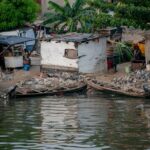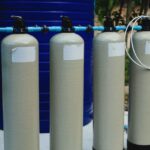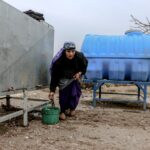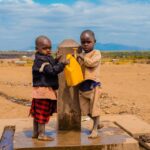How Poor Water Quality in Cameroon Affects Public Health

When people drink or use dirty water, they risk contracting dangerous diseases – a result of constantly being exposed to unclean water. Germs like bacteria and parasites play a major role in causing diseases in Cameroon.
Poor water quality remains a critical challenge in many communities, especially in rural areas, which rely on rivers, lakes, or wells that are contaminated. It can lead to serious health problems, causing diseases that affect children, adults, and to a larger extent, entire communities.
In this article, we will explore the impact of poor water quality on health in Cameroon, the common diseases caused by dirty water, the reasons behind water contamination, and possible solutions to this crisis.
The State of Water Quality in Cameroon
Cameroon is blessed with many water sources, including rivers like the Sanaga and Wouri. However, despite the availability of water, millions of people struggle to access clean and safe drinking water.
This is due to constant contamination of the water. With pollution from nearby industries and poor hygiene, the water in Cameroon has reduced in quality and become poor for drinking and other uses.
Challenges with Water and Sanitation in Cameroon
- Limited access to clean water: Many people usually have to walk long distances to find water, which still may be unsafe for drinking, because consumption of water in Cameroon is greater than the available facilities for clean water.
- Poor sanitation facilities: Many communities lack proper toilets, causing human waste to mix with water sources. Some people will also go and surface water bodies like rivers to dispose of their waste.
- Aging and damaged water infrastructure: In urban areas, damaged water systems lead to contamination as dirty water mixes with drinking water. With rusted and worn-out water pipes, it’s all the more difficult to keep clean water.
- Industrial and agricultural pollution: Factories and farms sometimes release waste into rivers without proper treatment. The waste could be harmful chemicals or heavy metals that cause different kinds of diseases.
- The effects of climate change: Climate change is making clean water harder to find in Cameroon. Droughts dry up water sources, while heavy rains cause floods that mix clean water with dirt and waste. Rising temperatures also help bacteria spread, leading to more diseases. Without action, access to safe water will keep getting worse.
The combination of these challenges makes it difficult for many Cameroonians to stay healthy.
Common Waterborne Diseases in Cameroon
Contaminated water is a breeding ground for bacteria and parasites that cause life-threatening illnesses. Some of the most prevalent waterborne diseases in Cameroon include:
1. Diarrheal Diseases
Diarrhea is the frequent stooling due to ingestion of unclean water and is one of the leading causes of death among children under five in Cameroon. The harmful bacteria in dirty water infect the intestines, leading to severe diarrhea, dehydration, and malnutrition. Without access to clean water and medical care, diarrhea can be fatal, especially for children.
2. Cholera
Cholera is a severe waterborne disease that spreads quickly in areas with poor sanitation. It causes extreme dehydration due to profuse diarrhea and can be deadly if not treated promptly. Cholera outbreaks frequently occur in Cameroon, especially in overcrowded regions with inadequate sanitation. Lack of toilets and clean water sources is a major concern for Cameroonians.
3. Typhoid Fever
Typhoid fever is another dangerous illness caused by consuming contaminated water or food. It is caused by the Salmonella typhi bacteria, which enters the bloodstream and causes high fever, stomach pain, weakness, and loss of appetite. Symptoms like headaches usually accompany typhoid fever. Many Cameroonians, especially in crowded urban areas contract typhoid due to the contamination of drinking water – no thanks to the lack of proper sanitation and poor hygiene practices.
4. Malaria
Although malaria is not directly caused by drinking dirty water, stagnant water creates the perfect environment for mosquitoes to breed. These mosquitoes spread malaria by biting people and infecting them with the Plasmodium parasite. Areas with poor drainage, flooded streets, and unclean surroundings are hot spots for malaria outbreaks. The disease causes high fever, chills, headaches, and severe weakness, and if left untreated, can be fatal.
5. Skin Infections and Eye Diseases
When people bathe or wash clothes in polluted water, they expose their skin and eyes to harmful bacteria and parasites. This leads to infections like:
- Scabies: a skin condition that causes itching and rashes.
- Trachoma: an eye infection that can lead to blindness if untreated.
You see, it’s dangerous to use unclean water even to bathe or wash. These infections are common in villages where people depend on rivers and streams for daily use.
Weak Government Regulation on Water Contamination in Cameroon
One of the major causes of water contamination in Cameroon is weak enforcement of water safety regulations by the government. Although laws exist to protect water sources, poor implementation allows pollution to persist. The key issues include:
1. Poor Enforcement of Water Laws
Factories are required to treat their waste before releasing it into rivers, but many ignore this rule. The agencies responsible for monitoring water quality lack the staff and resources to conduct regular inspections. As a result, harmful chemicals and untreated waste flow freely into drinking water supplies, putting communities at risk.
2. Lack of Investment in Clean Water Systems
Cameroon struggles with outdated and inadequate water infrastructure. In cities like Douala and Yaoundé, old, broken pipes allow contaminated water to mix with clean supplies. In rural areas, many lack access to proper treatment systems entirely. Without sufficient government funding, upgrading these systems remains a distant goal, leaving clean water out of reach for millions.
3. Low Public Awareness and Accountability
Many Cameroonians are unaware of their right to safe drinking water, so they don’t demand improvements. At the same time, industries and communities that pollute face little to no consequences due to lax enforcement. This lack of awareness and accountability allows water contamination to go unchecked, worsening the crisis.
What Needs to Change?
The government must ensure that water laws are followed, invest in better water infrastructure, and educate people about the importance of clean water. If these actions are taken, Cameroonians can have access to safer drinking water and better health.
The Impact of Poor Water Quality on Society
The consequences of poor water quality go beyond health problems; they also affect the economy, education, and overall well-being of Cameroonians.
- Healthcare burden: The government and families spend large amounts of money on treating waterborne diseases. Treatment of diseases is very expensive and some people, especially in rural areas, might not be able to afford it. They thereby live with an illness that might eventually lead to death.
- Educational setbacks: When children are sick due to dirty water, they miss school, affecting their education. Some children also might be used to source water in the community for their families, eventually missing school as a result.
- Economic decline: Sick people cannot work effectively, which slows down economic growth. For people working on farms, they are unable to work properly due to the lack of access to water.
For Cameroon to address its water crisis effectively, stricter enforcement of environmental laws, better investment in water infrastructure, and increased public awareness are necessary. Without these changes, millions will continue to suffer from preventable, waterborne diseases.
Ongoing Efforts to Improve Water Quality in Cameroon
Several organizations and government agencies are working to improve water access and sanitation in Cameroon.
1. Government Initiatives
The Cameroonian government, along with international organizations like UNICEF and WHO, has launched programs to:
- Build clean water facilities in rural areas.
- Improve sanitation by providing better toilets and waste management systems.
- Educate people on the importance of hygiene and clean water.
2. NGO and Community-Led Efforts
Non-governmental organizations (NGOs) like Aqua Maya are also helping communities by:
- Digging wells and boreholes for clean water.
- Teaching people how to purify water using simple methods, like boiling and filtration.
- Encouraging good hygiene practices to prevent diseases.
- Creating awareness of the people and effects of poor water.
Sustainable Solutions for the Future
For Cameroon to have long-term solutions to its water crisis, the following actions are necessary:
- Investing in modern water treatment plants to provide clean water for all.
- Encouraging rainwater preservation to increase water supply in dry areas.
- Protecting natural water sources by reducing pollution and deforestation.
Conclusion
Clean water is a basic human right, but millions of Cameroonians still struggle to access it. Poor water quality leads to diseases like cholera, typhoid, and malaria, which worsens public health, education, and economic growth.
While the government and several non-profit organizations (NGOs) are making efforts to improve the situation, more still needs to be done. The government needs to enforce more regulations to promote water quality in Cameroon. Organizations like Aqua Maya need to come in numbers to help in providing access to clean water. By increasing investments in clean water infrastructure, promoting sanitation, and educating people on hygiene, Cameroon can ensure a healthier future for its citizens.
Sources
1. https://www.unicef.org/cameroon/water-sanitation-and-hygiene-0
2. https://pmc.ncbi.nlm.nih.gov/articles/PMC5409641/#B17-ijerph-14-00441






